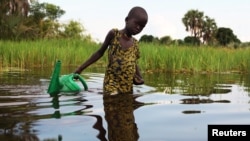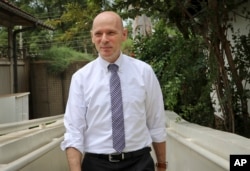At least 5,000 residents in and around the South Sudanese capital now have access to clean drinking water after the opening of a U.S.-funded, solar-powered water distribution system in the area.
Speaking at a ribbon-cutting ceremony Tuesday at the plant, U.S. Ambassador to South Sudan Tom Hushek said the $70,000 project not only will supply residents with clean drinking water, but it should lessen the number of sexual attacks on women and girls who often walk several hours a day to find clean water.
Previously, residents in Juba's Gudele West neighborhood and nearby Luri County had to pay 500 South Sudanese pounds for a 120-liter water container. Now, residents can fill up containers of drinking water for free in their neighborhood.
Agnes Stephen, a 22-year-old Luri County resident, is overjoyed.
"We used to face a lot of challenges accessing water. The water tankers would attempt to reach to our area, but because the roads are bad with a lot of bumps, they would not reach. And the water tankers that managed to reach us, they sell the water expensively," Stephen told VOA's South Sudan in Focus.
The system consists of an 80-meter-deep borehole and an elevated water tower with a tank that can hold up to 30,000 liters of water.
Using solar power, the water is pumped from the borehole to the tank. The water then flows by gravity into three distribution points.
Women and other residents ululated Tuesday as Hushek cut the ribbon, officially opening the new water plant to residents.
Hushek said a big secondary benefit to having easy access to clean drinking water is preventing the spread of disease.
"The project is improving community health and helping prevent diseases such as cholera. But the project does a lot more than that. I am especially proud that this project is sustainable because the community manages it. They have elected a water committee, and it includes 50 percent women," Hushek said.
The International Organization for Migration constructed the new water distribution plant as part of a $34 million government-funded project providing humanitarian assistance across South Sudan.
According to U.N. agencies, more than 90 percent of the population in war-ravaged South Sudan lacks access to clean water.





